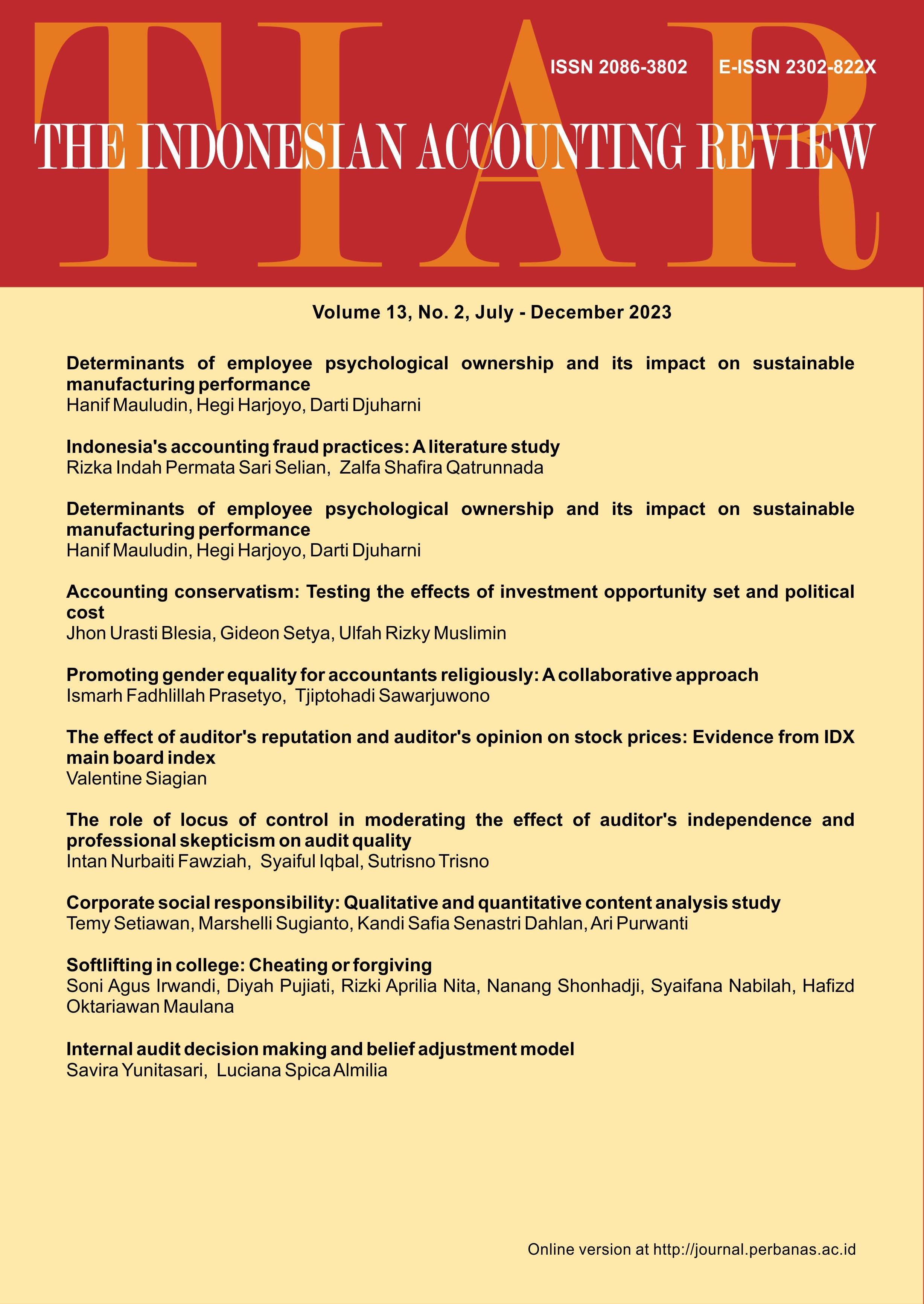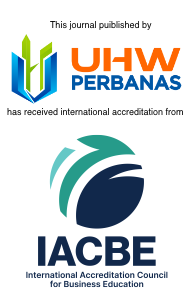Creating business values based on spirituality and authenticity of Sustainable Development Goals (SDGs): Inspiration from PwC and BTS
DOI:
https://doi.org/10.14414/tiar.v13i2.3348Keywords:
Sustainable Development Goals, Accountability, Spirituality, Be Well Work Well, BTSAbstract
Various issues regarding human rights violations, exploitation of nature, poverty, war, disease, and other sustainability problems have triggered the birth of the Sustainable Development Goals (SDGs) targeting seventeen interlinked objectives by 2030. The implication of this movement, initiated by the United Nations, is a challenge for all organizations and communities to take responsibility for sustainability reporting. There have been many studies and research forums related to reporting, such as Global Reporting Initiative (GRI) and Integrated Reporting (IR). Despite all the progress that has been made by the world community for the success of the SDGs, there is still one fundamental point that has not been widely researched: spirituality. This study believes that without good spirituality, no business entity can carry out programs that are aligned with the SDGs effectively and honestly. This study views this as a gap that needs to be studied more deeply in terms of spirituality and the authenticity of the SDGs. By adopting two case studies, "Be Well, Work Well†program by PwC and movements in harmony with SDGs by idol group BTS, with a literature study approach, this study aims to build a rationalization conceptual model that combines spiritual awareness, SDGs, and business value creation. The results of this study indicate that spirituality is a fundamental aspect of the impact of the SDGs, both internally and externally oriented. Finally, a movement of kindness that is carried out correctly and sincerely will have an impact on increasing business value. This study reveals that spiritual and material aspects are an inseparable unity.
References
Aditia, A. (2022). Sambutan Hangat Dan Pujian Presiden Biden Un-tuk BTS di Gedung Putih. Www.Kompas.Com. https://www.kompas.com/hype/read/2022/06/03/091744466/sambutan-hangat-dan-pujian-presiden-biden-untuk-bts-di-gedung-putih
Al Mubarak, Z., Ben Hamed, A., & Al Mubarak, M. (2019). Impact of corporate social responsibility on bank’s corporate image. Social Responsibility Journal, 15(5), 710–722. https://doi.org/10.1108/SRJ-01-2018-0015
Alderman, L. (2013). Public outrage over factory conditions spurs labor deal. New York Times.
Aniftos, R. (2022). BTS earns three New Social Media Guinness World Records. Billboard. https://www.billboard.com/music/pop/bts-guinness-world-records-social-media-1235039796/
Antunes, A. (2021). Zara accused of alleged “Slave labor†in Brazil. Forbes. https://www.forbes.com/sites/andersonantunes/2011/08/17/zara-accused-of-alleged-slave-labor-in-brazil/?sh=73b6a2771a51
Arbar, T. (2021). Top army! Lagu BTS Menang voting opening final Euro 2020.
Campbell, C. (2013). Dying for some new clothes: Bang-ladesh’s Rana Plaza Tragedy. Worldtime. https://world.time.com/2013/04/26/dying-for-some-new-clothes-the-tragedy-of-rana-plaza/
Coopers., P. (n.d.). Be well, work well, PwC. PwC.
de Villiers, C. J., & Barnard, P. (2000). Environmental reporting in South Africa from 1994 to 1999: A research note. Meditari Accountancy Research, 8(1), 15–23. https://doi.org/10.1108/10222529200000002
Deegan, C. (2022). Introduction: The legitimising effect of social and environmental disclosures – a theoretical foundation. Accounting, Auditing & Accountability, 15(3), 282–311. https://doi.org/https://doi.org/10.1108/09513570210435852
Gustafs, K. (2015). “The true cost†attacks the busi-ness of fast fashion,. Cnbc.
Hasan, I., Kobeissi, N., Liu, L., & Wang, H. (2018). Corporate social responsibility and firm financial performance: the mediating role of productivity. Journal of Business Ethics, 149(3), 671–688. https://doi.org/https://doi.org/10.1007/s10551-016-3066-1
Hasibuan, L. (2021). Tampil Lagi di Sidang PBB, omongan BTS Ini Bikin Terharu. Cnbc Indonesia.
Hunt, K., & Kassim, A. (2013). Bangladesh tragedy spurs nationwide probe of garment factories. CNN. https://edition.cnn.com/2013/04/29/world/asia/bangladesh-building-collapse/index.html
Lee, S. H., Choi, S., & Kim, H. W. (2021). Unveiling the success factors of BTS: a mixed-methods approach. Internet Research, 31(5), 1518–1540. https://doi.org/10.1108/INTR-12-2019-0507
Scott, S. (2007). Corporate Social Responsibility and the Fetter of Profitability. Social Responsibility Journal, 3(4), 31–39. https://doi.org/10.1108/17471110710840215
Sendari, A. (2020). 7 biodata member BTS Dan Fakta Menariknya, Army Wajib Tahu. Liputan6. https://hot.liputan6.com/read/4351064/7-biodata-member-bts-dan-fakta-menariknya-army-wajib-tahu
Shahbaz, M., Karaman, A. S., Kilic, M., & Uyar, A. (2020). Board attributes, CSR engagement, and corporate performance: What is the nexus in the energy sector? Energy Policy, 143, 111582. https://doi.org/10.1016/J.ENPOL.2020.111582
Shahzad, M., Qu, Y., Javed, S. A., Zafar, A. U., & Rehman, S. U. (2020). Relation of environment sustainability to CSR and green innovation: A case of Pakistani manufacturing industry. Journal of Cleaner Production, 253, 119938. https://doi.org/10.1016/J.JCLEPRO.2019.119938
Shou, Y., Shao, J., Wang, W., & Lai, K. hung. (2020). The impact of corporate social responsibility on trade credit: Evidence from Chinese small and medium-sized manufacturing enterprises. International Journal of Production Economics, 230, 107809. https://doi.org/10.1016/J.IJPE.2020.107809
Soeherman, B. (2022). Inilah Rahasia Capaian BTS! Sangat Inspiratif! From Physical to Spiritual Movement. Kompasiana. https://www.kompasiana.com/calvinchannel1385/629ead42aa3ccd0d51773172/inilah-rahasia-capaian-bts-sangat-inspiratif-form-physical-to-spiritual-movement
Sui, W., Yang, C., & Zhang, H. (2019). Is corporate social responsibility used to mask corporate speculation? Evidence from emerging China. Sustainability (Switzerland), 11(12), 1–23. https://doi.org/10.3390/SU11123375
Tjahjadi, B., Soewarno, N., & Mustikaningtiyas, F. (2021). Good corporate governance and corporate sustainability performance in Indonesia: A triple bottom line approach. Heliyon, 7(3), e06453. https://doi.org/10.1016/j.heliyon.2021.e06453
UNDP. (2017). Annual Report 2017. https://annualreport.undp.org/2017/?utm_source=EN&utm_medium=GSR&utm_content=US_UNDP_PaidSearch_Brand_English&utm_campaign=CENTRAL&c_src=CENTRAL&c_src2=GSR&gclid=CjwKCAjw5NqVBhAjEiwAeCa97fC8zqh0XUUshhzF1sI-HvsKevfR1Uimfg98Qe2k_138jzognhwYOBoCcP8QAvD_BwE
UNICEF. (2021). UNICEF and BTS celebrate success of “groundbreaking†love myself campaign. https://www.unicef.org/press-releases/unicef-and-bts-celebrate-success-groundbreaking-love-myself-campaign
van Balen, M., Haezendonck, E., & Verbeke, A. (2021). Mitigating the environmental and social footprint of brownfields: The case for a peripheral CSR approach. European Management Journal, 39(6), 710–719. https://doi.org/10.1016/j.emj.2021.04.006
Waagstein, P. (2011). The Mandatory Corporate Social Responsibility in Indonesia: Problems and Implications. Journal of Business Ethics, 98(3), 455–466. https://doi.org/https://doi.org/10.1007/s10551-010-0587-x
Zhou, G., Sun, Y., Luo, S., & Liao, J. (2021). Corporate social responsibility and bank financial performance in China: The moderating role of green credit. Energy Economics, 97, 105190. https://doi.org/10.1016/J.ENECO.2021.105190
Downloads
Additional Files
Submitted
Published
How to Cite
Issue
Section
License
Copyright (c) 2023 The Indonesian Accounting Review

This work is licensed under a Creative Commons Attribution-NonCommercial 4.0 International License.

















